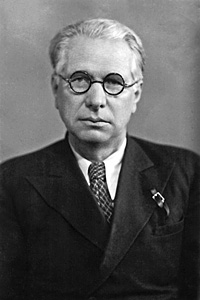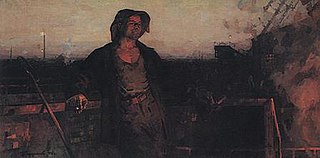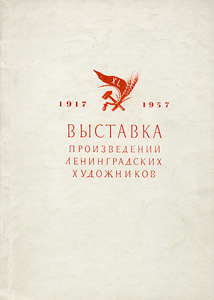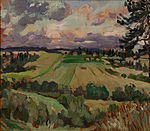
Alexander Nikolayevich Samokhvalov was a Soviet Russian painter, watercolorist, graphic artist, illustrator, art teacher and Honored Arts Worker of the RSFSR, who lived and worked in Leningrad. He was a member of the Leningrad branch of Union of Artists of Russian Federation, and was regarded as one of the founders and brightest representatives of the Leningrad school of painting, most famous for his genre and portrait painting.

Rudolf Rudolfovich Frentz was a Soviet and Russian painter, watercolorist, graphic artist, illustrator and art teacher who lived and worked in Leningrad. He was a member of the Leningrad Union of Artists and one of the founders of the Leningrad school of painting, most famous for his battle and monumental painting.

Elena Konstantinovna Gorokhova was a Russian painter, living and working in Saint Petersburg, regarded as one of representatives of the Leningrad School of Painting.

Leonov Pavel Petrovich was a leading naive artist of the Soviet period.

Olga Borisovna Bogaevskaya was a Russian Soviet painter and graphic artist, who lived and worked in Saint Petersburg - Petrograd - Leningrad. She was a member of the Leningrad Union of Artists, regarded as one of the leading representatives of the Leningrad School of painting.

Olga Igorevna Kabo is a Soviet and Russian theatre actress, stuntwoman, and singer.
The year 1954 was marked by many events that left an imprint on the history of Soviet and Russian Fine Arts.
The year 1953 was marked by many events that left an imprint on the history of Soviet and Russian Fine Arts.
The year 1952 was marked by many events that left an imprint on the history of Soviet and Russian Fine Arts.
The year 1945 was marked by many events that left an imprint on the history of Soviet and Russian Fine Arts.
The year 1944 was marked by many events that left an imprint on the history of Soviet and Russian Fine Arts.
The year 1943 was marked by many events that left an imprint on the history of Soviet and Russian Fine Arts.
The year 1942 was marked by many events that left an imprint on the history of Soviet and Russian fine arts.
The year 1941 was marked by many events that left an imprint on the history of Soviet and Russian Fine Arts.
Boris Alexandrovich Fogel was a Russian Empire and Soviet painter and art educator who lived and worked in Leningrad, a member of the Leningrad Union of the Soviet Artists, and a professor of painting at the Repin Institute of Arts who played an important role in the formation of the Leningrad School of Painting.

The All-Union Art Exhibition Dedicated to the 40th Anniversary of the Great October Socialist Revolution was one of the largest art exhibitions in Soviet history. Exhibition took place in Manezh Exhibition Hall from November 5, 1957, to May 1958.

The Anniversary Art Exhibition , dedicated to the 40th Anniversary of the October Revolution, was one of the most significant events of Soviet art history in the 1950s and in the whole of early Khrushchev Thaw. The exhibition took place in the State Russian Museum.
The House of Creativity "Staraya Ladoga" was an all-Russian centre for artistic creativity, which existed in the Volkhovsky District of Leningrad Oblast from the mid-20th century up to the 1990s. It was located opposite the ancient village of Staraya Ladoga on the right bank of the Volkhov River.

Nadezhda Sapozhnikova was a Russian painter and a maecenas. Sapozhnikova was born in a merchant family and received her education in Kazan. At the age of 27, Nadezhda started to practice painting. Together with her supervisor Nicolai Fechin Sapozhnikova travelled to Paris, where from 1910 to 1912 she studied in the studios of Antonio DeVity and Kees van Dongen. After returning to Kazan, Sapozhnikova opened her own studio and provided Fechin with financial support – she owned 11 of his works, including five portraits of her. Until 1925 Nadezhda taught painting and drawing in Kazan, then moved to Moscow. In the 1930s, she eventually finished her career as an artist. Up to now, only a few works of Sapozhnikova have been preserved; some of her paintings are exhibited at the National Gallery of Art "Hazine".
Maria Igorevna Safronova is a Russian artist. She is a participant of Moscow, Russian and foreign exhibitions and the member of the Moscow Union of Artists. She is included in the Top 100 recognized artists of Russia according to «InArt». In 2017, 2018, she entered the Russian Investment Art Rating 49ART, which represents outstanding contemporary artists under the age of 50. In 2015, she became the laureate of Sergey Kuryokhin Award in the nomination «The best Work of Visual Art».













